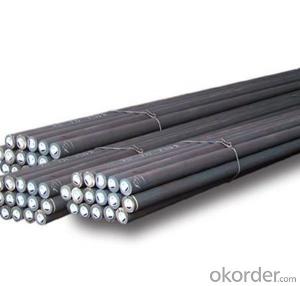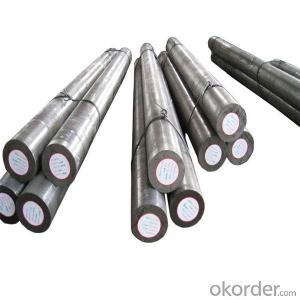Special Steel GCr15 Cold Work Die Steel Steel Bar
- Loading Port:
- China main port
- Payment Terms:
- TT or LC
- Min Order Qty:
- 25 m.t.
- Supply Capability:
- 10000 m.t./month
OKorder Service Pledge
OKorder Financial Service
You Might Also Like
Item specifice
Special Steel GCr15 Cold Work Die Steel Steel Bar
Product Description:
1. Production Standards: GB, AISI, ASTM, SAE, EN, BS, DIN, JIS
2. Smelt Iron -EAF smelt Billet - ESR smelt Billet -Hot rolled or forged steel round bar and plate
3. Heat treatment: Normalized / Annealed / Quenched+Tempered
4. Quality assurance: All orders received; Third party inspections including SGS, BV, and others test company test and inspect our products before shipping
Product Specifications:
Chemical Composition(GB)%
C | Si | Mn | Cr | Cu | S |
0.95-1.05 | 0.15-0.35 | 0.25-0.45 | 1.4-1.65 | ≤0.20 | ≤0.020 |
Heat Treatment
Item | Temperature ℃ | Hardness |
Anneal | 790-810 | 170-207HB |
Quenching | 830-860 | 62-66HRC |
Tempering | 150-180 | 61-66HRC |
Product Applications:
Used to make the load of the larger small cross-section conditioning and stress smaller large parts
Product Details:
Plastic Mould Steel
DIN 1.2311,1.2738,1.2083,1.2316 etc.
AISI P20,P20+Ni,420 etc.
JIS SUS420J2
Hot Work Steel
DIN 1.2344,1.2343,1.2367,1.2365,1.2581,1.2713 etc.
AISI H13,H11,H10,H21, etc.
JIS SKD61,SKD6,SKD5,SKT4 etc.
Cold Work Steel
DIN 1.2739, 1.2601, 1.2080, 1.2436, 1.2631, 1.263, 1.2510, 1.2327 etc.
AISI D2, D5, D3, D6, A8, A2, O1 etc.
JIS SKD10, SKD11, SKD1, SKS3 etc.
High Speed Steel
DIN 1.3343, 1.3243, 1.3247, 1.3355 etc.
AISI M2, M35, M42, T1 etc.
JIS SKH51, SKH35, SKH59, SKH2 etc.
Alloy Structural Steel
DIN 1.7035,1.6511,1.7220,1.7225 etc.
AISI 5140, 4340, 4135, 4140 etc.
JIS SCr440,SNCM439,SCM435,SCM440 etc.
Stainless & Carbon Steel or Others
DIN 1.4125,1.1191 etc
AISI 440C,1045, 1020 etc.
JIS SUS440C,S45C etc
Product show

Workshop show

- Q:How does special steel perform in low-temperature environments?
- Special steel, also known as low-temperature steel, is specifically designed to perform exceptionally well in low-temperature environments. One of the key features of special steel is its ability to maintain its strength and toughness even at extremely low temperatures. This is crucial in industries such as oil and gas, where equipment and structures are exposed to extreme cold conditions. When exposed to low temperatures, regular steel tends to become brittle and lose its mechanical properties, making it prone to cracking and failure. However, special steel is formulated with specific alloying elements, such as nickel, chromium, and molybdenum, which enhance its low-temperature performance. These alloying elements help to prevent the formation of brittle phases, which allows the steel to retain its toughness and ductility even at sub-zero temperatures. Special steel is extensively used in cryogenic applications, where temperatures can reach as low as -196 degrees Celsius (-320 degrees Fahrenheit). It is commonly employed in the construction of cryogenic storage tanks, liquefied natural gas (LNG) carriers, and other components that come into contact with extremely cold fluids or gases. In low-temperature environments, special steel not only maintains its mechanical properties but also exhibits excellent resistance to corrosion. This is vital, as low temperatures can exacerbate corrosion issues in many materials. The corrosion resistance of special steel is attributed to its high nickel content, which forms a protective oxide layer that prevents the steel from corroding, even in harsh conditions. Overall, special steel is specifically engineered to withstand the challenges posed by low-temperature environments. Its ability to retain strength, toughness, and corrosion resistance makes it an ideal choice for various industries operating in extreme cold conditions.
- Q:How can I determine the cooling water flow of square billet mold for special steel?
- Mold heat balance method. If the heat of the molten steel in the mould is taken away from the cooling water, the heat released by the solidification of the molten steel is equal to the amount taken away by the cooling water
- Q:What are the typical mechanical properties of special steel?
- The typical mechanical properties of special steel can vary depending on the specific grade and composition. However, some common characteristics include high tensile strength, good ductility, excellent hardness, and resistance to wear and corrosion. Special steels often exhibit superior toughness, heat resistance, and high fatigue strength, making them suitable for demanding applications in industries such as aerospace, automotive, and construction.
- Q:How is nitriding steel used in the manufacturing of engine components?
- Nitriding steel is commonly used in the manufacturing of engine components due to its ability to improve their hardness, wear resistance, and fatigue strength. By subjecting the steel parts to a controlled nitrogen-rich environment, the process of nitriding forms a hard surface layer on the components, enhancing their durability and reducing the chances of premature failure. This makes nitrided steel components well-suited for use in engine parts such as crankshafts, camshafts, and valves, where high strength and resistance to wear are crucial for optimal performance and longevity.
- Q:How is special steel used in the production of pressure vessels?
- Special steel is used in the production of pressure vessels due to its high strength, durability, and resistance to corrosion. It ensures the vessel can withstand high internal pressure and harsh operating conditions, ensuring safety and reliability.
- Q:How is silicon steel used in electrical transformers?
- Silicon steel is used in electrical transformers as it possesses high magnetic permeability and low electrical conductivity, making it an ideal choice for the core material. The silicon content in the steel increases its resistivity and reduces the energy losses caused by eddy currents. This allows for efficient energy transfer and minimizes heat generation within the transformer.
- Q:How does special steel contribute to the aerospace aftermarket industry?
- The aerospace aftermarket industry heavily relies on special steel to provide critical components that are vital for the safe and efficient operation of aircraft. Special steel possesses high strength, durability, and temperature resistance, making it an ideal material for a wide range of aerospace applications. Engine components are primarily manufactured using special steel, particularly nickel-based superalloys. These alloys are used to produce turbine blades, compressor discs, and shafts, which are essential elements of jet engines. These components must be able to withstand extreme temperatures, pressures, and mechanical stresses, and special steel alloys offer the necessary properties to ensure reliable and long-lasting performance. Special steel is also utilized in the production of structural components in aircraft. Steel alloys with high strength-to-weight ratios, such as titanium alloys, are employed to construct critical parts like landing gear, wing spars, and fuselage frames. These components need to be lightweight yet strong enough to endure the forces and stresses experienced during flight. Special steel alloys provide the required mechanical properties to ensure the structural integrity and safety of the aircraft. In addition to engine and structural components, special steel is crucial for the production of fasteners, bearings, and other small but vital parts. These components play a significant role in holding various parts together and ensuring the proper functioning of systems. Special steel alloys with exceptional corrosion resistance, fatigue strength, and wear resistance are used to guarantee the reliability and longevity of these critical components. Furthermore, special steel plays a vital role in the maintenance, repair, and overhaul (MRO) activities of the aerospace aftermarket industry. Due to the rigorous demands placed on aircraft components, regular inspections, repairs, and replacements are necessary to maintain their airworthiness. Special steel materials are commonly used for MRO purposes because they are compatible with existing aircraft systems and can meet the stringent requirements of aerospace regulations. Overall, special steel is an indispensable material in the aerospace aftermarket industry. Its unique properties and characteristics enable the production of high-performance engine components, lightweight structural parts, and reliable small components. The use of special steel ensures the safety, efficiency, and longevity of aircraft, contributing to the overall success and growth of the aerospace aftermarket industry.
- Q:Can special steel be used in the manufacturing of sports equipment?
- Sports equipment can benefit from the use of special steel, which is a specific type of steel engineered to possess certain properties. These properties, including high strength, durability, corrosion and wear resistance, and the ability to withstand extreme conditions, make special steel suitable for various specialized applications. In the production of sports equipment, special steel can be utilized in different ways. For instance, it can be employed to create the shafts of golf clubs or tennis rackets. The high strength and stiffness of special steel are crucial for ensuring optimal performance in these items. Moreover, special steel can be used in the construction of bicycles, where its lightweight yet strong properties are highly desirable. Furthermore, special steel can be applied to manufacture accessories for sports equipment, such as hooks, buckles, or fasteners. These components often require high tensile strength and corrosion resistance, which can be provided by special steel. By using this type of steel, the longevity and reliability of the equipment can be ensured. In conclusion, special steel can be used in the manufacturing of sports equipment to enhance performance, durability, and overall quality. Its unique properties make it a suitable choice for improving various aspects of sports equipment.
- Q:What are the properties of high-strength steel?
- High-strength steel possesses a range of properties that make it desirable for various applications. It is known for its exceptional strength-to-weight ratio, allowing for lighter and more efficient structures. Additionally, high-strength steel offers excellent durability, toughness, and resistance to fatigue, making it suitable for withstanding heavy loads and extreme conditions. Moreover, this type of steel exhibits good weldability and formability, allowing for ease of fabrication. Overall, the properties of high-strength steel enable it to provide enhanced performance, structural integrity, and cost-effectiveness in a wide array of industries.
- Q:Can special steel be used in the appliance manufacturing industry?
- Yes, special steel can be used in the appliance manufacturing industry. Special steels, such as stainless steel or high-strength steel, offer various advantages such as corrosion resistance, durability, and enhanced mechanical properties. These qualities make them suitable for manufacturing appliances that require high performance, such as refrigerators, ovens, or washing machines. Additionally, special steels can be customized to meet specific design requirements and can contribute to the overall aesthetic appeal of the appliances.
1. Manufacturer Overview |
|
|---|---|
| Location | |
| Year Established | |
| Annual Output Value | |
| Main Markets | |
| Company Certifications | |
2. Manufacturer Certificates |
|
|---|---|
| a) Certification Name | |
| Range | |
| Reference | |
| Validity Period | |
3. Manufacturer Capability |
|
|---|---|
| a)Trade Capacity | |
| Nearest Port | |
| Export Percentage | |
| No.of Employees in Trade Department | |
| Language Spoken: | |
| b)Factory Information | |
| Factory Size: | |
| No. of Production Lines | |
| Contract Manufacturing | |
| Product Price Range | |
Send your message to us
Special Steel GCr15 Cold Work Die Steel Steel Bar
- Loading Port:
- China main port
- Payment Terms:
- TT or LC
- Min Order Qty:
- 25 m.t.
- Supply Capability:
- 10000 m.t./month
OKorder Service Pledge
OKorder Financial Service
Similar products
New products
Hot products
Related keywords




























